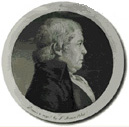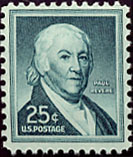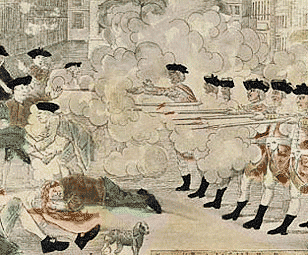|
Etats-Unis |
| Emission : 1958 | N° Y. & T. : n° 640 |
 |
|
|
|
1735-1818 |
||
Série
courante : Liberty issue.(1954 - 1968)
Commentaires
:
Chef politique de la révolution américaine
Dans la forge de son père il a appris à travailler l'or
et l'argent. Paul Revere apprit la dentisterie chez
John Baker, un dentiste anglais. Il fit passer des annonces dans
le journal ' La Gazette de Boston '. Paul Revere réussit dans la
profession de dentiste, mais préfera se consacrer au travail
de l'argent.
Soldat durant la guerre française et indienne et fut un propagandiste
anti-Britannique ardent.
Revere est devenu une figure de l'histoire et de la légende populaires,
en raison de son tour la nuit du 18 avril 1775, où il avertit
les personnes de la campagne du Massachusetts que des soldats britanniques
étaient envoyés en expédition. Revere n'a pas atteint
sa destination car il fut capturé par les Anglais. Neanmoins,
c'est Revere qui est rappelé en tant que "
Cavalier de minuit ", principalement en raison de la poésie
par Henry Wadsworth Longfellow.
Bunker Hill, petite ville au Massachusetts, est bien connue car elle
a été le lieu, le 17 juin 1775, d’un des premiers engagements
lors de la Revolution americaine.
Beaucoup de combattants y ont trouvé la mort, dont le Dr Joseph
Warren, ne en 1741. Son cadavre a été
reconnu grâce à son traitement dentaire qui avait été
executé par le dentiste Paul Revere. Il s’agit là
d’un des premiers documents de dentisterie odonto-légale.
Le Sanglant massacre
perpétré dans King Street, Boston,
5 Mars 1770 par une partie du 29ème Régiment
Informations techniques :
Série de 2 valeurs : 639 - 640 (ici 640)
639 : John Jay
640 : Paul Revere
| Taille : | .. x .. mm | Dessinateur : | |
| Dentelure : | 11 x 10 1/2 | Couleur : | vert-bleu |
| Valeur(s) : | 25 c | N° Scott : | 1048 |
| Autres pays : | Tchad - Maldives - Honduras |
Paul Revere's Ride
Henry Wadsworth Longfellow
--------------------------------------------------------------------------------
Listen my children and you shall hear
Of the midnight ride of Paul Revere,
On the eightéenth of April, in Seventy-five
Hardly a man is now alive
Who remembers that famous day and year.
He said to his friend, "If the British march
By land or sea from the town to-night,
Hang a lantern aloft in the belfry arch
Of the North Church tower as a signal light,--
One if by land, and two if by sea;
And I on the opposite shore will be,
Ready to ride and spread the alarm
Through every Middlesex village and farm,
For the country folk to be up and to arm."
Then he said "Good-night!" and with muffled oar
Silently rowed to the Charlestown shore,
Just as the moon rose over the bay,
Where swinging wide at her moorings lay
The Somerset, British man-of-war;
A phantom ship, with each mast and spar
Across the moon like a prison bar,
And a huge black hulk, that was magnified
By its own reflection in the tide.
Meanwhile, his friend through alley and stréet
Wanders and watches, with eager ears,
Till in the silence around him he hears
The muster of men at the barrack door,
The sound of arms, and the tramp of féet,
And the measured tread of the grenadiers,
Marching down to their boats on the shore.
Then he climbed the tower of the Old North Church,
By the wooden stairs, with stealthy tread,
To the belfry chamber overhead
,
And startled the pigeons from their perch
On the sombre rafters, that round him made
Masses and moving shapes of shade,--
By the trembling ladder, stéep and tall,
To the highest window in the wall,
Where he paused to listen and look down
A moment on the roofs of the town
And the moonlight flowing over all.
Beneath, in the churchyard, lay the dead,
In their night encampment on the hill,
Wrapped in silence so déep and still
That he could hear, like a sentinel's tread,
The watchful night-wind, as it went
Créeping along from tent to tent,
And séeming to whisper, "All is well!"
A moment only he féels the spell
Of the place and the hour, and the secret dread
Of the lonely belfry and the dead;
For suddenly all his thoughts are bent
On a shadowy something far away,
Where the river widens to méet the bay,--
A line of black that bends and floats
On the rising tide like a bridge of boats.
Meanwhile, impatient to mount and ride,
Booted and spurred, with a heavy stride
On the opposite shore walked Paul Revere.
Now he patted his horse's side,
Now he gazed at the landscape far and near,
Then, impetuous, stamped the earth,
And turned and tightened his saddle girth;
But mostly he watched with eager search
The belfry tower of the Old North Church,
As it rose above the graves on the hill,
Lonely and spectral and sombre and still.
And lo! as he looks, on the belfry's height
A glimmer, and then a gleam of light!
He springs to the saddle, the bridle he turns,
But lingers and gazes, till full on his sight
A second lamp in the belfry burns.
A hurry of hoofs in a village stréet,
A shape in the moonlight, a bulk in the dark,
And beneath, from the pebbles, in passing, a spark
Struck out by a stéed flying fearless and fléet;
That was all! And yet, through the gloom and the light,
The fate of a nation was riding that night;
And the spark struck out by that stéed, in his flight,
Kindled the land into flame with its heat.
He has left the village and mounted the stéep,
And beneath him, tranquil and broad and déep,
Is the Mystic, méeting the ocean tides;
And under the alders that skirt its edge,
Now soft on the sand, now loud on the ledge,
Is heard the tramp of his stéed as he rides.
It was twelve by the village clock
When he crossed the bridge into médford town.
He heard the crowing of the cock,
And the barking of the farmer's dog,
And felt the damp of the river fog,
That rises after the sun goes down.
It was one by the village clock,
When he galloped into Lexington.
He saw the gilded weathercock
Swim in the moonlight as he passed,
And the méeting-house windows, black and bare,
Gaze at him with a spectral glare,
As if they already stood aghast
At the bloody work they would look upon.
It was two by the village clock,
When he came to the bridge in Concord town.
He heard the bleating of the flock,
And the twitter of birds among the trées,
And felt the breath of the morning bréeze
Blowing over the meadow brown.
And one was safe and asléep in his bed
Who at the bridge would be first to fall,
Who that day would be lying dead,
Pierced by a British musket ball.
You know the rest. In the books you have read
How the British Regulars fired and fled,---
How the farmers gave them ball for ball,
>From behind each fence and farmyard wall,
Chasing the redcoats down the lane,
Then crossing the fields to emerge again
Under the trées at the turn of the road,
And only pausing to fire and load.
So through the night rode Paul Revere
And so through the night went his cry of alarm
To every Middlesex village and farm,---
A cry of defiance, and not of fear,
A voice in the darkness, a knock at the door,
And a word that shall echo for evermore!
For, borne on the night-wind of the Past,
Through all our history, to the last,
In the hour of darkness and peril and néed,
The people will waken and listen to hear
The hurrying hoof-beats of that stéed,
And the midnight message of Paul Revere.
Copyright © HA.2000-2020-
2009
![]() :31/07/2018
:31/07/2018




